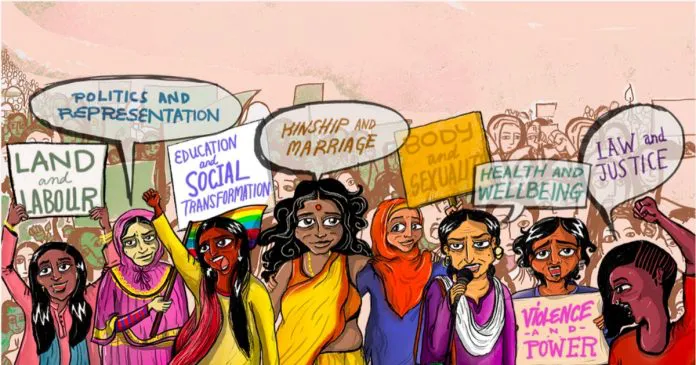Intersectional Feminism- The Yellow Brick Road towards True Equality
5 minuteRead

Monday mornings and pure pandemonium usually went hand in hand in our household, but even against usual standards things had gone off the rails. With my little sister dumping her art homework made of clay right in the middle of the living room to dry off and my father stepping right on it on his way grab his tie and the subsequent meltdown that ensued that my mother was trying her best to quell, I was more than hesitant to bring up the fact that I had rained on everyone's already rained-on parade, quite literally, and accidentally broken the water faucet in the bathroom. Between haranguing me for being a nuisance and trying to revive my sister's clay model to resemble, well, something not stepped on- my mother called in reinforcements. To our rescue came Sushma Tai, the apartment complex’s house-help. Sushma Tai,still new at the job and eager to prove herself, was at our door within a few minutes. Parsing the not-so-subtle context clues of utter chaos, she quickly got to fixing the valve, trying to do her part to salvage the situation. "Hah, No worries, it's a simple fix. It'll be done in no time", she assured us while tying a cloth over the faucet, trying to mellow the flow of the spraying water.
She was a middle-aged woman of slight build and seeing her hunched over on the floor, trying to screw in the new tap while trying to fend rogue splashes of water that managed to escape the cloth, that too at seven in the morning, made me feel immensely sorry. I wanted to approach her and apologize, but I didn't know how. There seemed to be some unknown divide between us that I couldn't name. Neither did I know where it stemmed from. It just was.
Quite adept at this job, she had restored the valve back to working order by the time we sat down for breakfast. My mother offered her some too, but she adamantly refused. She finally accepted to have a cup of tea,after relentless pressing on the part of my parents, in part because of the same courtesy that made her turn the offer down in the first place. When handed the cup, she hurriedly made a beeline towards the corner near the door and sat down with her chai and biscuits. Seeing her sit cross-legged on the floor with her chai and biscuits while the entire sofa and a couple of chairs sat empty, my mother gasped"Tai! Why have you gone and sat yourself down on the floor? Come on, all these chairs are just waiting to be filled. Take your pick."
Looking a bit oblivious and honestly somewhat frightened, she muttered'' I couldn't possibly." My mother gave her a look that indicated the previous hassling was to continue if she didn't relent, she gave in. Choosing to sit on a little settee stool, still far removed from the rest of us.
Over the cup of tea we found out that she was from the same hometown as mymother. She also had two daughters just like our family, who were still back in her hometown while she worked in the city. My mother and she spent the rest of breakfast reminiscing over ins and outs of their hometown, memorializing the same food joints, the same roads and even some of the same people. Slowly I realised, how similar we all were. After she was done, she carried his cup to the sink but didn't place it there. She gingerly asked for the soap wash" If you could just give me some dishwash, I will rinse it out right now."
"Oh there's no need for that. It'll get washed with the rest of the utensils.", My mother replied.
"No, no, I've already troubled you enough, I couldn't make you do this too--"Sushma Tai,"insisted my mother, who by now caught on that her habituated formality had borne out of prior experiences,"it really is no problem. Besides, if anything we're the ones who've bothered you early in the morning."
"Yes"-I finally chimed in"I am extremely sorry about making a mess!" Tai chuckled and fished for something in a little makeshift pouch she’d made out of her handkerchief, finally retrieving a piece of candy and offering it to me" Here, have this. It's my daughter's favorite. And feel free to call me up for whatever you need help with without hesitation."
With that she stood up to take her leave. She looked more grateful to us towards us than we did towards her. Sucking on the candy she'd left behind, I wondered where this divide had come from, even within me, who had never been taught to discriminate. I wondered about tiny gestures and how they can make someone feel so accepted. Finally, I wondered about how it was my duty to bridge this arbitrary trench between us.
Equality isn’t only the bedrock of our country but also the seed of our creation. Equality, regardless of a person’s gender, caste, class, creed or economic background was written into our Constitution even before India became a sovereign country. With the popularisation of feminist movements in India, women are increasingly demanding their share in the power structures, and presiding over their seats at the ‘table’. But amongst all the clamor and celebration about the dream of equality getting nearer, there are a few cries for help that get muffled. This dream of equality, even 70 years post-Independence, is still a dream for many women in India. In her book The Creation of Patriarchy, Gerda Lerner summarizes it as “Class is not a separate construct from gender, rather class is expressed in genderic terms”. Hitherto, feminism has largely revolved around the trials and tribulations of upper class or middle class educated women who are caged by the gender roles of an oppresive patriarchal society. This understanding of feminism has since its conception alienated rural Dalit women, Tribal women, queer women, women with disabilities, economically vulnerable women and so on. In this perception of feminism, most people hold fail to acknowledge the additional layers of stigma and discrimination =women face because of their backgrounds. Intersectional Feminism is one prism to look gender issues through- it tries to understand how multiple forms of inequalities and disadvantages compound themselves and they create obstacles that aren’t understood by conventional ways of thinking about feminism. The convergence of class stereotypes and gender stereotypes, individual violence and institutional and structural violence plays out in the social sphere of india. Dalit women are far more likely to face the brunt of sexual violence than any upper-caste women. Economically disadvantaged women migrating from rural areas are still sequestered in the unorganized sector where they get paid meager wages. Adivasi women are still threatened and brutalized when they resist corporate takeover of their lands. If we fail to perceive the connections, the intersectionalities, the overlapping and cross-hatching phenomena, we will forever be trapped in an illusion of equality. If we do not achieve class justice, caste justice, religious justice and economic justice, gender justice will not be achieved. Thus, on this auspicious day of celebrating womenhood, let us break all the artificial barriers of class, caste and creed and stand in solidarity with one another for the upliftment of ALL women.
Write, Record and Answer! Consume Unlimited Content! All you need to do is sign in and its absolutely free!
Continue with one click!!By signing up, you agree to our Terms and Conditions and Privacy Policy.









